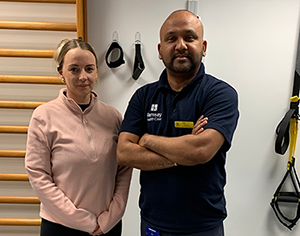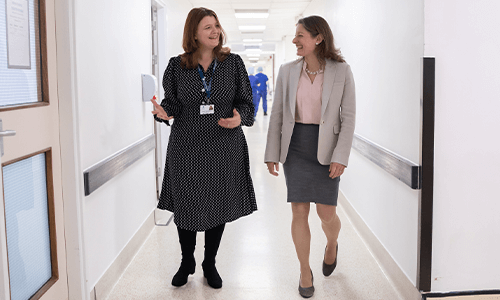An inguinal hernia, also known as a 'groin hernia' is the pushing out of abdominal organs, such as your intestines, through a weak area in your groin, called the inguinal canal. Inguinal hernias happen because of weakened or deteriorating abdominal muscles which can be due to normal due to age. Some babies are born with a weakened abdominal wall as their abdominal lining doesn’t close properly, and are susceptible to inguinal hernias at a very early age.
An inguinal is most common in men and happens when fatty tissue or a part of your bowel pokes through a weak spot in the surrounding muscle wall and allows a bulge to form in your groin at the top of your inner thigh. This hernia pushes into an area called the inguinal canal.
Inguinal hernias, sometimes referred to as a groin hernia, are the most common type of hernia and mainly occur in men much more than women. Aging is usually the most common factor associated with the weakening of the adbominal wall making inguinal hernias most likely to develop in older males. However, they can occur at any age in children and babies due to a weakness within the groin area.
Hernias aren’t always serious, but they can worsen over time and develop serious complications. As time goes on, more tissue can push through the hernia opening as it gets weaker and wider, making it more likely to become trapped.
This can potentially be dangerous and even life threatening if the tissue that is stuck contains blood vessels such as veins, known as a strangulated hernia.
Inguinal hernias happen because of weakened or deteriorating abdominal muscles that are caused by:
- Age
- Strenuous physical activity
- Carrying heavy loads
- Chronic coughing or sneezing
- An increase in pressure in your abdomen such as pregnancy
- Straining during bowel movements or urination
- A pre-existing weak spot in your abdominal wall
- An injury or abdominal surgery
- Jobs that require standing for many hours at a time
Some babies are born with a weakened abdominal wall as their abdominal lining doesn’t close properly, and are susceptible to inguinal hernias at a very early age.
Potential complications
An inguinal hernia that is left untreated may stay the same or get larger and more painful. It will not get any smaller or heal on its own.
An inguinal hernia that gets bigger becomes more susceptible to incarceration and strangulation.
An incarcerated hernia happens when your herniated tissue becomes trapped and cannot easily be moved back into place. It can lead to a bowel obstruction that causes severe pain, nausea, vomiting, and the inability to have a bowel movement or pass gas.
In extreme cases, an incarcerated hernia may cut off the blood supply to part of your intestine. This is a medical emergency and is known as hernia strangulation. It can have serious implications and, in some cases, lead to life-threatening complication
Inguinal hernia diagnosis
An examination of the patient for a bulge or lump in the groin area will be the first step towards an inguinal hernia diagnosis. If the surgeon can't see the hernia from the outside they may also reccomend that the patient is referred for a ultrasound in most cases or CT scan in more complicated cases.
Inguinal hernia surgery and treatment
An inguinal hernia needs surgery to be fully repaired. Surgery is usually recommended if your hernia becomes larger or more painful or you have signs of incarceration (trapped hernia) or strangulation (cut-off blood supply), which are medical emergencies.
Non-surgical options can help manage your hernia symptoms and prevent complications. These include lifestyle changes such as maintaining a healthy weight to reduce abdominal pressure, eating high-fibre foods to prevent constipation, and avoiding heavy lifting to avoid abdominal strain. Quitting smoking can help prevent coughing and strengthen your connective tissue.
You can try hernia trusses or belts to help keep your hernia in place and to provide temporary relief from discomfort. Address allergies, respiratory infections, or other causes of chronic coughing and sneezing to reduce abdominal pressure.
Types of inguinal hernia surgery
Inguinal hernia repair is a very common surgical operation that can be performed by open or laparoscopic surgery. The decision on the type of surgery will be discussed in detail with you at your consultation and is based on your preferred method and your surgeon's experience.
What is the best treatment?
The best treatment for an inguinal hernia will depend on a number of things including the size of your hernia, its symptoms, and your overall health. The most common treatment options include:
- Watchful waiting: Regular monitoring of small, asymptomatic hernias is recommended to check for changes or complications.
- Lifestyle modifications: Adjustments like avoiding heavy lifting, losing weight, and treating constipation can alleviate symptoms and prevent your hernia from worsening.
- Surgical repair: For symptomatic or growing hernias open or laparoscopic hernia repair surgery is usually recommended.
What will happen if an inguinal hernia is left untreated?
If you leave an inguinal hernia untreated, it may carry on growing or stay the same size. It will not get better. The only cure for a hernia is surgery.
You can ‘watch and wait’ with an inguinal hernia. If it doesn’t get any worse you can continue to live with it. If it gets bigger and more painful, surgery may be advised or necessary.
Potential complications from surgery
Inguinal hernia repair surgery carries very few risks. Complications that may occur include: the hernia returning, a build-up of fluid or blood in the space where the hernia was, groin pain and, nerve damage. In men there is a rick of: testicle blood supply damage, vas deferens tube damage and, pain, swelling and bruising of the testicles or at the base of the penis.
Inguinal hernia recovery
You can expect to go home the same day or the day after your inguinal hernia procedure. You will need a lift home and an adult to stay with you for 24 hours after your surgery.
You need to eat a healthy high-fibre diet and drink plenty of fluids to avoid constipation, and to care for your wound. You should follow any specific aftercare instructions that our hospital staff give you. You can continue to take hospital-advised painkillers if you have pain.
You can gradually get back to your daily activities, as long as they aren’t causing you pain. As a guide, you can expect to drive, perform light activities such as shopping, and go back to work within two weeks.
You should avoid heavy lifting and strenuous activities until four to six weeks after your operation. Most people feel fully recovered after six weeks.
What is the cost of an inguinal hernia procedure?
The cost of an inguinal hernia procedure will depend on whether you have open or keyhole surgery and your Ramsay hospital of choice.
This is a guide package price that estimates the costs of your surgery. You will receive a formal quotation price following your consultation with one of our expert surgeons. This formal quote for your inguinal hernia procedure will be valid for 60 days and includes unlimited aftercare.
We have a number of finance options if you are paying for your inguinal hernia repair surgery yourself. These include:
- Interest-free finance - requires no deposit, offers the ability to pay in monthly instalments, and benefits from 0% interest
- All-inclusive Total Care - a single one-off payment at a pre-agreed price that delivers direct access to all the treatment you need for complete reassurance
- Pay as you go – a flexible funding option if your treatment costs are difficult to assess, that allows you to meet your treatment costs as and when they arise.
Inguinal hernia repair surgery is covered by most medical insurance policies. We advise you to check with your insurance provider and obtain their written authorisation before starting your treatment.



